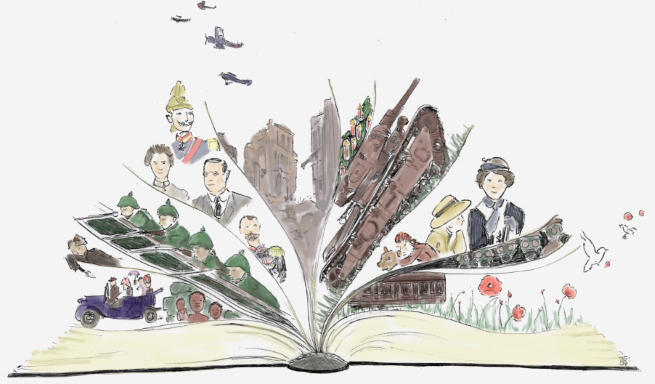
"Transforming Europe"
is an eTwinning and Erasmus Plus project for secondary school students on WWI and its consequences 1918 - 2018.
Module 2 (Mar 2016 - Sep 2016) focuses on LITERATURE
and encourages students from Croatia, Denmark, Germany, Poland and The Netherlands to
work creatively with poems and prose of the time.
CONTENTS
Welcome
Writers' Gallery
2.1 Glory and Grief
2.1 Task 1: A Memorable Teacher/Lesson (Warmup activity: Students exchange school anecdotes via a forum.)
2.1 Task 2: A Good Teacher (Students compile a list of characteristics of a good teacher.)
2.1 Task 3: Remarque: All Quiet on the Western Front (Students analyze the first two film scenes, 00:00 - 09:58, and discuss the role of the teacher and the reactions of the students.)
2.1 Task 3: Remarque: Material
2.1 Task 4: Kipling: For All We Have and Are
2.1 Task 4: Kipling: Material
2.1 Task 4: Kipling: Creative Work (Students create their own war posters with text snippets from Kipling's poem)
2.1 Task 5: Asquith: The Volunteer
2.1 Task 5: Asquith: Material
2.1 Task 5: Asquith: Creative Work (Students work on war memorial designs based on Asquith's poem.)
2.1 Task 6: Tynan: Joining the Colours
2.1 Task 6: Tynan: Material (Students choose quotations from Tynan's Joining the Colours and illustrate them with screenshots from the 1930 film adaptation of Erich Maria Remarque's All Quiet on the Western Front, 10:00 -33:16)
2.1 Task 7: Brooke: The Soldier
2.1 Task 7: Brooke: Material (Students write a dialogue between Brooke's soldier and a person of their choice about why he should/shouldn't go to war.)
2.1 Task 8: Brooke's 'The Soldier' Revisited (Students read an interview with poetry expert Adrian Barlow from Cambridge University and summerise their own views on early British WWI poetry in a blog post.)
2.1 Task 8: Brooke: Material
Easter Greeting (Students are introduced to Edward Thomas' In Memoriam.)
2.2 Horror and Hope (War & Peace Vocabulary)
2.2 Task 1: Disillusioment (Students write postcards based on Sassoon's Dreamers)
2.2 Task 1: Material
2.2 Task 2: Reported Missing (Students chat about Rudyard Kipling's "My Boy Jack" and the film of the same title.)
2.2. Task 2: Material
2.2 Task 3: The White Feather Campaign (Students create a photo novel based on an extract from “Stay where you are and then leave” by John Boyne (2013) and “The Jingo-Woman” by Helen Hamilton)
2.2. Task 3: Material
2.2 Task 4: In the Trenches
2.2. Task 4: Material (Students find examples of word clouds based on Isaac Rosenberg's "In the Trenches" and make their own ones using either film scenes from All Quiet on the Western Front or a trench poem of their choice.)
2.2 Task 5: Animals in War
2.2 Task 5: Material (Students read two scenes from a dramatized version of Michael Morpurgo's 'War Horse'. Then they write their own account of what happened on Armistice Day from an unusual point of view, for example an animal's perspective.)
2.3 (Inter)National Perspectives (A poetry collection competition)
2.3 Task 1: The Home Front (Students collect poems which focus on life at the home front during WWI. Examples given are Nina MacDonald's Sing a Song of War-Time and Claude Debussy's Noël des enfants qui n’ont plus de maison.)
2.3 Task 1: French Material
2.3 Task 1: German Translation
2.3 Task 2: Recurring Motifs (Students look for poems from different countries with the same motif. Examples given are Guiseppe Ungaretti's Soldati and Margaret Postgate Cole's The Falling Leaves.)
2.3 Task 3: Anti-War Poems (Students read anti-war poems by Siegfried Sassoon and Gyóni Géza and search more critical or satirical WWI poems.)
2.3 Task 3: Satire (Info Text)
2.3 Task 3: German Translation
2.3 Task 4: Poison Gas (Students comment on Wilfred Owen's Dulce et Decorum est or review Jason Cobley's graphic novel adaptation.)
2.3 Task 4: Material
2.4 (Inter)Personal Perspectives
2.4 Task 1: Personal Favourites (Students share their favourite poems.)
2.4 Task 2: Teamwork with a Partner from Abroad (Students write an "Expressionist" poem.)
2.4 Task 2: Material
2.4 Task 3: Recitals (Recordings of student recitals)
2.4 Task 4: Brainstorming Ideas (Students gather ideas for their workshop week in Denmark)
2.4 Task 5: Excursions and Material (Students share interesting material and report on field trips.)
2.4 Task 6: 20th Century Writers inspired by WWI literature (Students read/watch extracts from Pat Barker's Regeneration)
2.4 Task 6: Material (Students get to know Sassoon's Glory of Women and exchange ideas about how to put a poem like this on stage.)
2.4 Task 7: 21st Century Poets inspired by WWI literature (Students develop further ideas with the help of Carol Ann Duffy's The Last Post.)
.............................................................................
Illustration: Rebekka Jochem